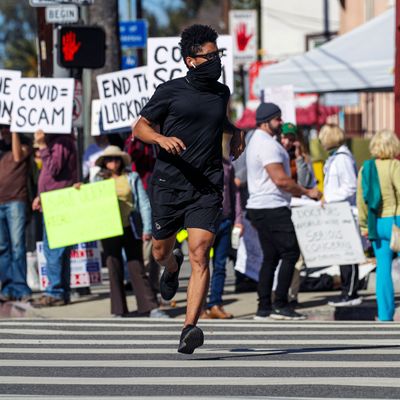
We’re getting crash courses galore on empathy these days — looking forward to the American national conversation on Afghan refugees? (For the record, we would probably benefit from giving a home to all of them.)
Meanwhile, coronavirus is (again and also still) tearing through states like Florida and Louisiana, with the vast, vast, vast majority of serious cases occurring among unvaccinated people. The death rate is beginning to rise in earnest, and vaccinated people are increasingly unable to make sense of the choice, here in mid-August, to be unvaccinated.
One home for the most furious of those types is a Reddit board called HermanCainAward, which bestows its titular award … posthumously. The forum is named for the former presidential candidate Herman Cain, a cancer survivor who was opposed to wearing masks to prevent transmission of coronavirus. Cain announced he had COVID about a week after some extensive traveling, which included attending Donald Trump’s infamous and absurd Tulsa, Oklahoma, rally in June 2020. He died about a month later — and, by the way, Tulsa shortly thereafter saw a large surge in cases.
HermanCainAward has some rules. Nominees for the award must have made public anti-vaccine or anti-mask statements and must be very ill or have died from complications of coronavirus; if you would like to dunk on someone who is just a regretful hypocrite, you would want to go to the subreddit called LeopardsAteMyFace, which takes its name from this always timely 2015 tweet:
There are a lot of Americans eligible for the HermanCainAward! More than you might suspect, even if you know a bunch of people who won’t get vaccinated and/or who think there’s a Joe Biden impersonator in the stage-set fake White House. (Important to know: Joe Biden is actually the president and is in the real White House, for better or for worse.)
Much of what you will learn from HermanCainAward winners, thanks to many screenshots from the accounts of people who have died, is just how awful Facebook is. Crappy low-res memes, misinformation, general jackassery, nastiness — it’s bad out there. This is misinformation that kills whole pews of churches. It’s unreal to witness the information filth-pit the anti-vaxxers live in, even if, like some of us, you are regularly exposed to and/or are related to them.
The screenshots that tend to get posted emerge mostly from a similar place — a tea-party/crueler stripes of Evangelical/white-supremacist salad. Comb through enough of them and maybe it’s easy to think there’s not much reason the vaccinated should feel bad for the tens of millions who don’t want to be part of our grand international science experiment.
This might be true even if you know that the loud, meme-friendly Trumpers don’t represent the vast numbers of the quietly unvaccinated, who are wildly diverse in motivation: made-up fear, well-founded fear, lack of time or money, exhaustion, truly reasonable medical distrust, lack of child care.
It’s just not that comprehendible to those of us with community norms that say vaccines are good for our neighborhood and school and workplace to comprehend the community norms that say, for instance, that a vaccine is tantamount to government control — where “those who get the shot can legitimately fear losing their job or incurring the wrath of their families and other reference groups,” as sociologist Brooke Harrington wrote earlier this month. Must feel pretty weird when your family puts on yellow stars and goes out to protest other people’s wearing masks!
Attempts to comprehend aren’t going great. The Washington Post covered “regretters” over the weekend; the New York Times did something related a few weeks back about folks who wish they’d gotten vaccinated sooner. Response was mixed! But going further, a few folks have taken a firm stand on a standard of universal empathy. It has not gone well for them.
“Stop sneering at unvaccinated people getting sick,” wrote Will Leitch last week, and pretty much everyone hated it. Reader comments included “I feel no pity for them” and “I’m tired of always having to be the bigger man.”
“Agreed” is how tech-newsletter writer Charlie Warzel tweeted about that column; then he got roasted. “I don’t want to celebrate people dying even if they are reckless & irresponsible,” he wrote.
Propaganda has undermined social trust between groups in lots of ways — for instance, if you think Hillary Clinton is trafficking children for sex in a pizza parlor, how can you trust anyone who voted for her? (For the record: Hillary Clinton is absolutely not doing this. It’s also incredible that we were forced to have a conversation about how Hillary Clinton is not a God-hating pedophile instead of having a conversation about how she’s a fairly religious warmonger.)
And propaganda aside, people are more likely to feel empathy for people they know well; they are also more likely to feel empathy around positive emotions than negative; human-wise, we are almost exactly set up to feel contempt for people we do not know and who have been cruel in public first. This is how we’re built. It’s never boded particularly well for a not-fractious United States — not in Mark Zuckerberg’s United States, at least.
We can certainly be pissed off at people endangering public health; we can be furious at people for making up lies. It might make you feel better. But if we want to survive the pandemic intact, we’re going to have to make sure we feel something more robust and honest than just rage. What if it turns out that you’re just sad and you were never willing to admit it?
The angriest among us, and maybe you’re one of them, do have some solid points. Take, for example, yesterday’s HermanCainAward winner, Jimmy DeYoung Sr., a Bible teacher who spread disinformation at a wide scale before dying from the illness himself. That’s a crappy legacy to leave behind. What will yours be?






























